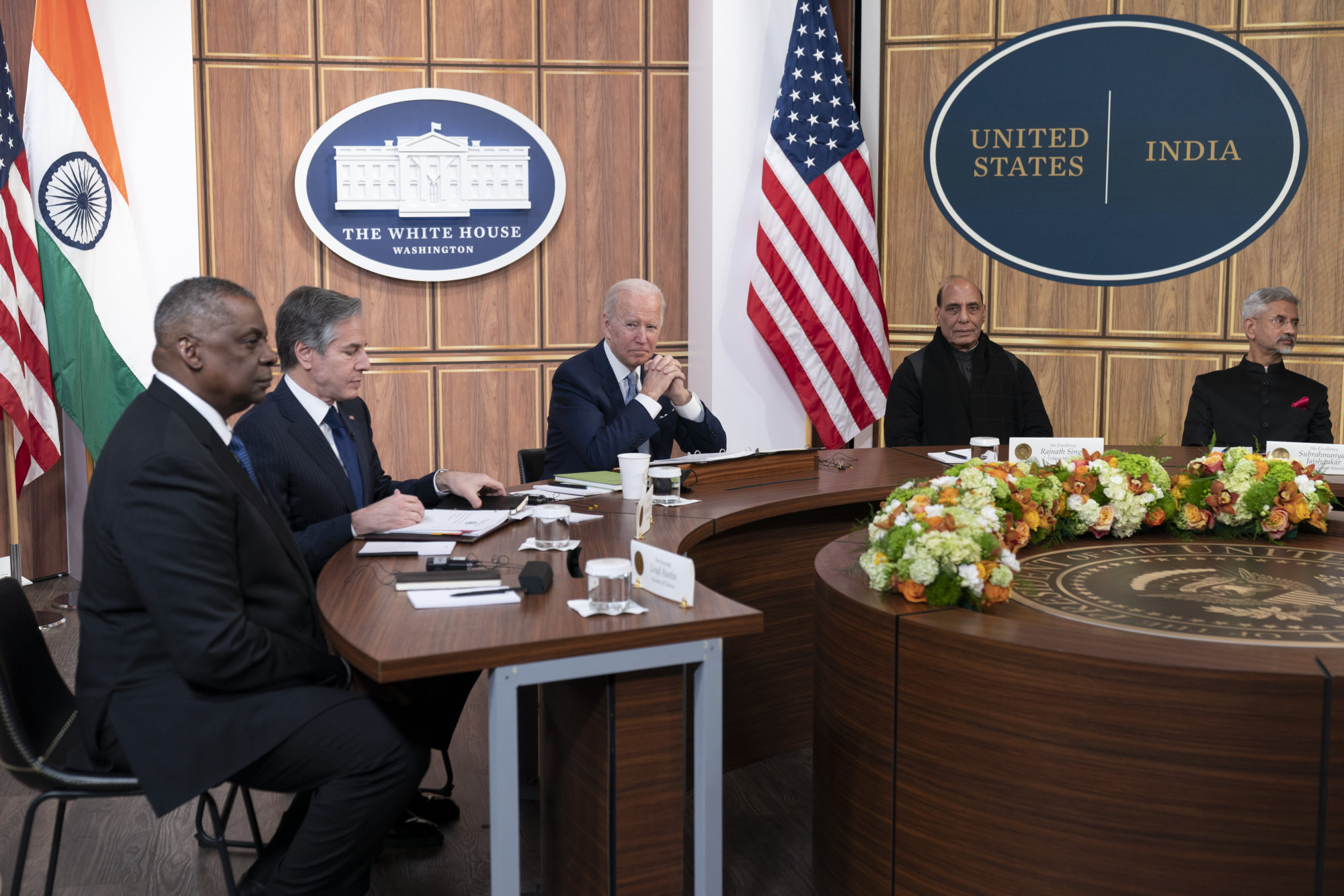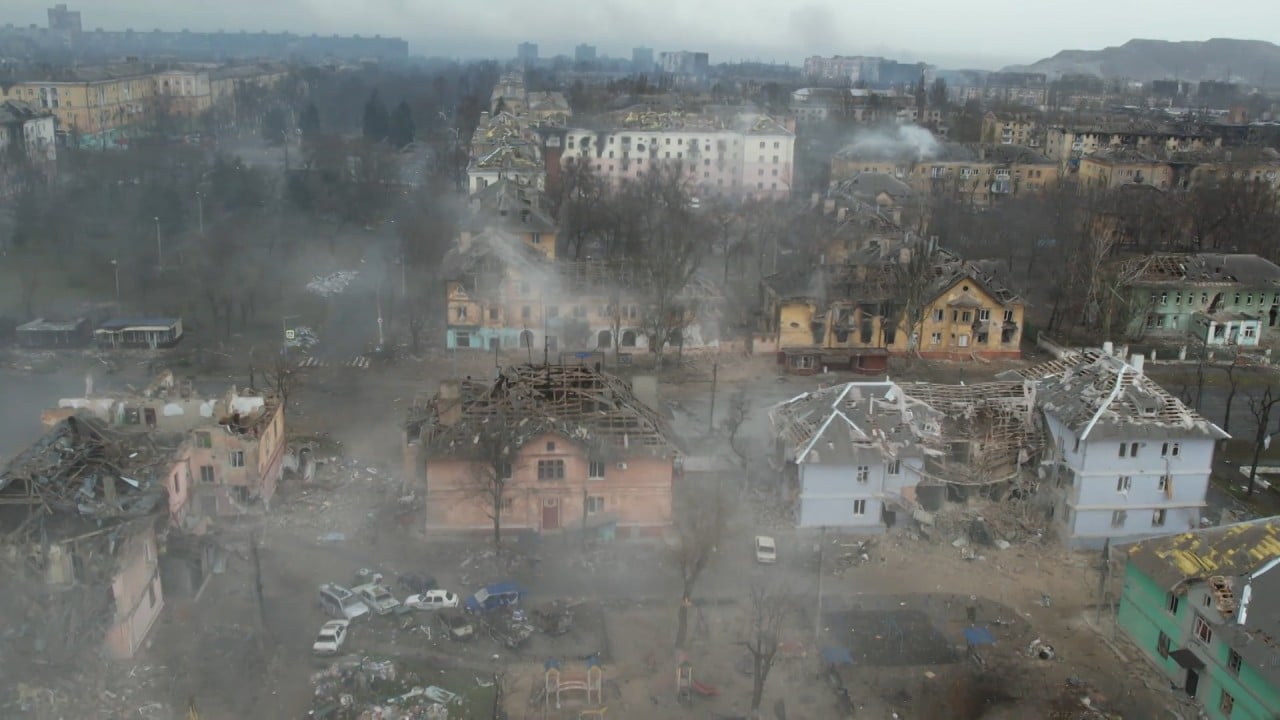
US and India pledge to deepen military cooperation in push for ‘larger relevance’ in Indo-Pacific
- US defence secretary Lloyd cites China threat in ‘2+2’ dialogue that also included his Indian counterpart Rajnath Singh
- Bilateral cooperation on multiple fronts has ‘a larger relevance for the Indo Pacific’, India’s Jaishankar says
The US and India on Monday pledged deeper military interoperability and intelligence sharing as part of a bilateral push to increase their influence in the Indo-Pacific region. US Defence Secretary Lloyd Austin also said that China posed a threat to the international system that Washington and Delhi support.
“The People’s Republic of China is seeking to refashion the region and the international system more broadly, in ways that serve its interest,” Lloyd told reporters in a briefing that followed the “2+2” dialogue that also included his Indian counterpart Rajnath Singh, US Secretary of State Antony Blinken and India’s External Affairs Minister Subrahmanyam Jaishankar.
“So I’m pleased that we’ve identified new opportunities to extend the operational reach of our militaries and to coordinate more closely together across the expanse of the Indo Pacific,” Austin added. “Especially following Russia’s invasion of Ukraine, it is more important than ever that we stand together to defend our shared values.”
Without referencing China specifically, Jaishankar lauded recent progress that India and the US have made in defence, trade and infrastructure development, and summed up the bilateral cooperation on multiple fronts “as having a larger relevance for the Indo Pacific”.
A White House readout of US President Joe Biden’s call with Indian Prime Minister Narendra Modi earlier in the day, said that the two leaders “emphasized their shared commitment, as leaders of the world’s largest democracies, to respect for the sovereignty and territorial integrity of all nations in the Indo-Pacific and beyond”.
They also discussed “the destabilizing impacts of Russia’s war against Ukraine, with a particular focus on global food supply”, according to the readout.

Having India on America’s side is critically important for the administration’s Indo-Pacific strategy, said Aparna Pande, director of the Hudson Institute’s Initiative on the Future of India and South Asia.
Since India has not been a traditional US military ally, having Delhi on Washington’s side might induce something of a domino effect in the region, Pande explained.
“If you convince India, you manage to convince a lot of other countries, because the other countries are watching what India is doing,” she said. “So it’s important for [the US] to get India, especially on the big issues.”
However, Pande added that interoperability is easier said than done because India sources its military hardware “increasingly” from Israel and France.
“If you have a mix, you can’t really have interoperability,” she said.
India wants trade with Russia; slams attacks on Ukraine
Biden’s team has been working to undo India’s decades-0ld relationship with Russia, which is the South Asian country’s biggest military supplier. And Delhi’s continued purchases of Russian oil have been something of a sore spot for Washington, since oil revenues help finance Russian President Vladimir Putin’s war effort in Ukraine.
Biden appeared to make some progress in forging closer ties on this front, with Singh saying that his side agreed to “make speedy decisions and implementation” on procurement of US technology.
However, there was no apparent progress on India’s energy trade with Moscow. Only 2 per cent of India’s oil imports come from Russia, a senior US administration official told reporters in a separate briefing on Monday previewing the 2+2 ministerial.
Asked about whether India would continue to import energy products from Russia, Jaishankar claimed that the country’s “total purchases for the month would be less than what Europe does in an afternoon”.

Reporters pressed the ministers on areas of friction in the US-India relationship, namely whether Washington would sanction Delhi over its purchase of Russian S-400 surface-to-air missile systems and India’s abstention from UN votes to condemn Russia’s actions in Ukraine.
Blinken also touted Delhi’s provision of “significant humanitarian assistance to the people of Ukraine, notably medicines which are very necessary”.
The 2+2 dialogues began under the Trump administration in 2018, and Monday’s meeting was the first held during Biden’s term.
Quad alliance diplomats stress ‘international law’ but don’t mention China
In addition to the 2+2 dialogue, India and the US are members of the Quad, an informal group including Australia and Japan that was resurrected by the Trump administration in 2017 amid rising tensions with China.
Under the Biden administration, the US has taken steps to formalise the partnership, including legislation being considered in Congress that would establish an inter-parliamentary working group for the Quad nations.
Jaishankar praised Biden’s efforts to bring the Quad into the forefront of international geostrategic partnerships.

“We appreciate the attention and energy devoted by the United States to the Quad,” he said. “Its elevation and intensification in the last year benefits the entire Indo-Pacific. Indeed, the quad has emerged as a powerful force of global good.”
Jaishankar and Singh both urged US aerospace companies to commit to manufacturing in India as a way to bring the two countries closer together militarily, a request that the US side did not address in their remarks to the media.
“We are talking to US companies for co-development and co-production. We are proposing it to them,” Singh said. “We have asked the US companies to work in the [Uttar Pradesh]/ Tamil Nadu corridor and invest in that area.”
While such an arrangement might benefit US producers in terms of lowering production costs and helping them sell more to other countries, Hudson’s Pande said, it would be challenging in terms of sharing proprietary technology.
“American defense corporations have historically been resistant to share their technology or to manufacture in another [country],” she explained.
Also on the agenda Monday was the economic unrest India’s neighbours Sri Lanka and Pakistan are facing, which has contributed to the ouster of Pakistan Prime Minister Imran Khan in Islamabad.
The US and India also marked their 75th year of diplomatic relations.



